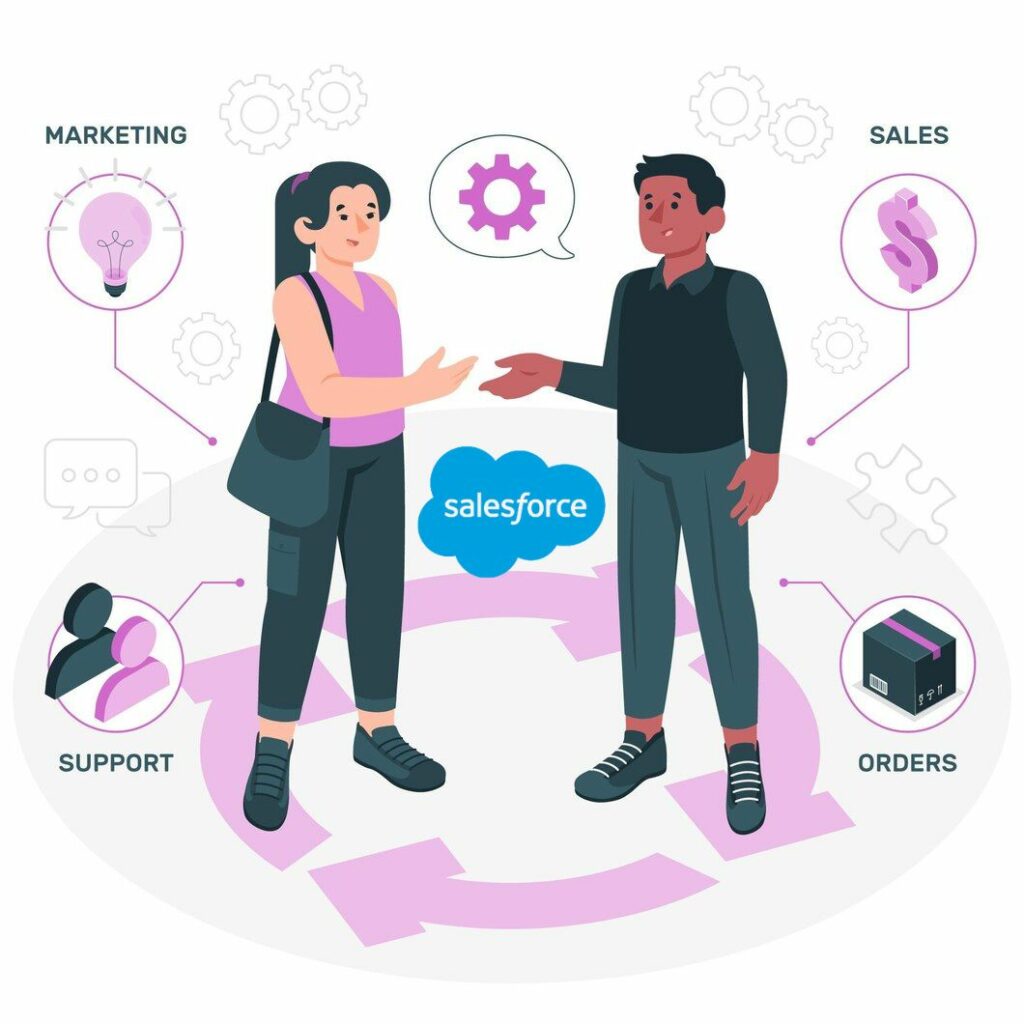Untangling your business problems with cloud ERP software
Untangling your business problems with cloud ERP software
You consider the following main parameters before deciding which ERP solution to be implemented:
- Features and functionalities
- Costs
- Scalability
- Ease of use
- Accessibility – Anytime, anywhere
Generally, the features and functionalities of a cloud solution and an on-premises solution remain the same. However, the difference lies in the other four factors, where cloud ERP software has the edge over the on-premises version.
What is cloud ERP software?
An ERP solution accessible over the internet is called cloud ERP software. An ERP vendor owns the cloud platform and hosts the ERP software over the cloud. The vendor provides ERP solutions to entities under the Software as a Service (SaaS) model.
What are the different types of clouds supporting ERP solutions?
Public cloud
The public cloud is the solution where multiple tenants share the infrastructure and applications, thus optimizing the costs. With the public cloud, a vendor hosts the solution in a data centre; users can access that via SaaS.
External private cloud
A vendor will provide the external data centre with the infrastructure and applications, wherein only you and the vendor can access the environment hosting the infrastructure and applications. Other companies, not parties to the contract, cannot access this infrastructure and applications.
Internal private cloud
Your software is available on a cloud existing inside the enterprise but behind a firewall. You manage, control, and protect the infrastructure and applications.
Hybrid cloud
A combination of public and private clouds makes up a hybrid cloud. Entities host some applications on public clouds to access them anywhere on any device. They protect some applications behind the firewall for the safety of data.

How is Cloud ERP different from on-premises ERP?
The entity hosts the ERP software on its servers for on-premises ERP software. Since the data and applications are stored locally on your hardware, the in-house IT team can manage the solution.
The points of difference between the cloud ERP and on-premise ERP are:
Core platform
In the case of on-premises ERP software, you must buy the core platform once. For this, you need to have the following:
- Enterprise-grade servers
- Databases
- Anti-virus software
- Operating systems
- Backup facility
You can buy them or outsource them from a vendor. The deployment of an on-premises ERP system takes up a lot of time in arranging multiple resources.
In the case of cloud ERP, you just rent it from a vendor. You need not buy any operating system, servers, or database. The vendor has it all. You must subscribe to it for accessibility. Another great advantage is that you need less time and effort to implement a cloud ERP solution.
IT Administration
For on-premises ERP software, your focus is the administration and maintenance of the solution. Your IT team needs to invest time and effort to update, upgrade, and maintain the ERP software. And you need to appoint such expert IT professionals to ensure maximum utility.
Your ERP vendor takes care of IT administration and maintenance for cloud-based ERP. The vendor’s technology professionals deploy, customize, and integrate the solution. Your IT team can focus on strategic issues necessary for business growth instead of managing the ERP solution.
Costs
You need to invest a lot of money buying the on-premises ERP platform and other hardware. You also need to spend money on frequent upgrades and updates to the system. Even implementation, integrations, customizations, and data migrations eat up the massive finances of your entity.
Hiring IT staff and training them in necessary skills is an additional financial burden. Thus, on-premises ERP is a capital expenditure with one-time perpetual license fees.
Your investments reduce in the case of cloud ERP software because you just need a running internet connection. Your vendor manages the implementation, integration, customization, updates, and maintenance.
Since it is a subscription model, you do not need to invest much money in one go. It requires a monthly/yearly cash outflow, which can be well-planned. You save on hardware, infrastructure, and IT staff hiring and training. Thus, a cloud ERP solution is an operating expenditure.
Accessibility
You can access your cloud ERP software on any device from any location and at any time. It is possible because the cloud solution is available over the internet. Also, you do not have to spend extra money for such accessibility.
A similar case does not exist in the case of an on-premise ERP solution. You must be in your office to access the ERP software hosted on your entity’s platform. So, you do not have access to your data when travelling, in a remote place, or when not connected to your laptop from your home.
Scalability
A significant benefit of a cloud ERP solution is its scalability. As you grow, your business requirements increase, and you need an increased and better infrastructure to take care of growing data. These requirements need additional server space and hardware to store more data and update the system. All this becomes next to impossible for the owner of an on-premise ERP solution.
In the case of a cloud ERP system, you need not buy new hardware or server. The vendor will manage your additional requirements of more users, more data storage capacity, and updates. Thus, the scalability of the entity becomes easier with a cloud solution.
- You expand to new locations; your cloud solution can accommodate new users.
- You introduce new products and services; the cloud ERP software can manage them.
- You acquire new companies or restructure; the system can handle the changes.
Thus, you can seize every new business opportunity to make your growth possible without worrying about managing your expanding business processes or data.
Data management
Since cloud solution is accessible over the internet, data updates occur in real-time. That means whatever data you use for insights and reports is up-to-date, accurate, and complete. Also, a cloud solution has an inherent backup facility, so you don’t lose crucial data when system updates and upgrades happen.
In the case of an on-premise solution, there is no automatic update of data. Since the software is stored on your platform, you must upgrade and update the solution. Also, if you don’t save data before updating, you may lose it.
What are the merits of cloud ERP software?
Some of the benefits of cloud ERP software are:
Customizability
You can customize the solution as per your business needs. You can add different functional modules, role-based dashboards, open APIs, etc.
It includes modules such as:
- Accounting & Financial management
- Inventory management
- Warehouse management
- Customer Relationship management
- Order management
- Supply Chain management
- Analytics and Reporting
Besides the modules, you can integrate them with your existing in-house applications. It is an easily integrable solution, improving your capability and functionality. You do not require additional hardware and do not suffer downtime during integration with other applications. Thus, you can get modules and applications per your requirements, capable enough to handle your different business needs.
Also, your customizations are not tied to the current ERP software version. The vendor manages the customizations and integrations as you update the software version.
Automation
A cloud ERP system automates all the simple business processes. You don’t need to work on the standard, routine tasks manually. Automated activities improve business productivity along with reducing errors and saving time.
You can set up automated workflows to save time. You can even set up alerts for approvals, meetings, reminders, etc., to simplify the process.
For example, you can have set templates for making invoices. You feed in the details to generate an invoice. The system directs an alert to the manager for approval. Once approved, the respective recipient (client) receives the forwarded mail. Similarly, when the client makes the payment, you receive a message for payment received from your bank.
Real-time and complete picture
Cloud ERP software has a central repository of data and information. This repository stores all information from different business functions of an entity. The software keeps the data updated, accurate, and accessible to every team as per the role permissions.
Access to such a database for all teams helps them have a complete picture of the processes. You can know what teams are doing good, where you are going wrong, and what improvements are needed. And this data remains up-to-date to give you the latest status of your operations.
Not only data, but the cloud ERP software also generates reports based on these insights. Customizable dashboards can be configured for managers to analyze performance. Thus, these customized, insightful reports help you make decisions for your business.
With automated processes, the reports are complete, data has no manual errors, and financial reporting happens on time. All this is possible because of a single, connected system.
Multi-management
The cloud ERP software supports multiple languages and currencies. Also, you can manage the data and processes of multiple offices, warehouses, and stores. You have the flexibility to generate consolidated reports as well as individual company reports.
Security
One of the biggest concerns of entities is the cloud ERP software’s security. Since an external vendor hosts the solution and you access it over the internet, it does not mean it is insecure or unsafe.
On the contrary, cloud ERP vendors provide more secure solutions than on-premises. They ensure compliance with quality and security certifications. Also, data backup and disaster recovery are better in the case of cloud solutions.
Entities do not have to worry if there is hardware or server failure. Vendors take care of that problem and have set policies to ensure business continuity. Also, vendors ensure end-to-end data encryption with the entity.
Get started with the right cloud ERP software
Despite all these benefits, entities fear investing in a cloud ERP solution because:
- Employees do not accept the significant changes due to the ERP solution and are not ready to adopt the new solution.
- Even if employees are ready, they cannot use the solution effectively due to a lack of training.
You can handle these risks when Cloudiotech is there to help you with the best solution – NetSuite cloud ERP software.
NetSuite ERP is a complete cloud-based solution for all your business needs. You can make operational improvements with a complete picture of all your processes. You have more agility and flexibility to respond to customer demands.
And, when Cloudiotech provides NetSuite services, you do not have to worry about the implementation. We ensure a customized NetSuite solution based on your industry requirements and growth stage. Our NetSuite consultants and experts train your employees to use the solution effectively.
We guarantee a successful integration and data migration to help you realize the maximum advantages of a cloud ERP solution. With Cloudiotech’s support in implementing NetSuite cloud ERP, we assure you of a worthy investment with high ROI.
Get a full range of NetSuite cloud solutions to transform your company
Get in touch with our Cloudiotech team today!




